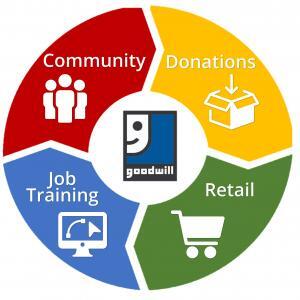By Amanda McElfresh, nola.com
Four years ago, Conisha Bee knew she needed to turn her life around. But, as she struggled to find a job, she wondered if anyone would give her an opportunity. It was a chance encounter with an employee from Goodwill Industries of Southeastern Louisiana that put Bee on the right path.
“I was actually about to start a different program when someone from Goodwill told me about their job readiness classes,” Bee recalled. “I decided to try one out. I didn’t want to leave. It was exactly what I needed at the time because I was lost. I didn’t know how I was going to make ends meet.”
Thanks to those classes and the support of the Goodwill team, Bee has established a new career at the organization. She is now a job readiness instructor, helping others learn employment and technology skills. It’s a position she could never have imagined being in just a few short years ago.
“It feels so good to help other people,” she said. “I’ve always loved working with people, so it has been the perfect fit. I’ve gone through some of the same things they have gone through, so I’m able to help them focus and overcome challenges.”
The job readiness program that helped Bee change her life is just one of many Goodwill initiatives that are helping people across southeast Louisiana. While most people know about Goodwill stores and donation sites, many are unfamiliar with other parts of the organization.
In fact, the sales from Goodwill retail stores benefit a wide range of programs, including those for individuals with disabilities, military veterans, formerly incarcerated individuals and foster children. Those programs help people receive education and training for future jobs, mentoring services, stable housing and more.
 “Our mission is to offer opportunities for people with employment barriers to improve their economic self-sufficiency through training, education, support services and employment,” said Scottie LeBlanc, vice-president of mission services at Goodwill Industries of Southeastern Louisiana.
“Our mission is to offer opportunities for people with employment barriers to improve their economic self-sufficiency through training, education, support services and employment,” said Scottie LeBlanc, vice-president of mission services at Goodwill Industries of Southeastern Louisiana.
LeBlanc said that funds from sales at Goodwill retail stores help the organization maintain those programs and continue to help the community. Even small contributions make an impact. For example, a donation of five shirts can fund 30 minutes of a financial literacy class. Ten plates and glasses can be turned into 20 minutes of job training. A used TV that is still in working order can become 40 minutes of job search support.
LeBlanc noted that just a few coins can add up and pay for services that are not covered by grants.
“When you check out at a Goodwill store, you’re asked if you want to round up your total to the nearest dollar,” he said. “That can help someone who has been incarcerated to pay old fees or renew their driver’s license. It sounds small, but those are big steps for a person working to rebuild their life.”
Since beginning her career with Goodwill, Bee has gotten a firsthand look at its impact.
“We’re so much more than a store,” she said. “It’s really a large organization that does a lot of good.”
Goodwill’s positive impact also extends to the environment. LeBlanc said that when Goodwill receives donated items, they are first sorted. If anything is not in a condition to be sold, it is recycled. Last year, more than eight million pounds of goods were recycled in the area. Whether the items are sold or recycled, they stay out of landfills, which reduces negative environmental impacts in the region and beyond.
To provide a firsthand look at the Goodwill Industries process, the organization offers tours of its local facilities on an appointment basis. LeBlanc said the tours include visits to a warehouse to see how donated items are sorted and recycled, as well as Goodwill computer labs, classrooms and training areas.
Click here for more information or to schedule a Goodwill Industries tour.

